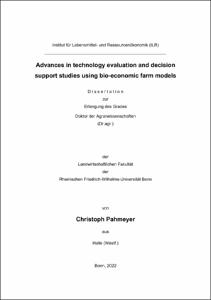Advances in technology evaluation and decision support studies using bio-economic farm models

Advances in technology evaluation and decision support studies using bio-economic farm models

| dc.contributor.advisor | Britz, Wolfgang | |
| dc.contributor.author | Pahmeyer, Christoph | |
| dc.date.accessioned | 2022-04-11T16:10:47Z | |
| dc.date.available | 2022-04-11T16:10:47Z | |
| dc.date.issued | 11.04.2022 | |
| dc.identifier.uri | https://hdl.handle.net/20.500.11811/9746 | |
| dc.description.abstract | The use of so-called bio-economic farm models makes it possible to determine the most cost-effective adaptation strategy to novel policy measures and to evaluate whether the use of new technologies can be economically viable for a farm. This thesis aims to show potential ways for modeling novel policies and technologies in the existing farm model FarmDyn as well as the decision support system ‘Fruchtfolge’ developed in the context of the thesis. As an example of a novel technology with far-reaching consequences on a farm's production process, the thesis highlights the economical optimal use of sex-sorted semen and crossbreeding among a dairy farm population from the German federal state of North Rhine-Westphalia. Using the holistic farm model FarmDyn, potential profit increases ranging from 0 €/cow/year to 568 €/cow/year, with an average of 79 €/cow/year are shown. The results demonstrate that modern breeding technologies have the potential to improve dairy farm profits, although they must be viewed in the context of farm-specific production settings. To assess a policy with measures targeting single fields of a farm in a bio-economic farm model, the thesis presents a novel decision support system called ‘Fruchtfolge’. The model assists farmers with finding a cost-minimal adoption strategy to the newly revised Fertilization Ordinance in Germany. The decision support system presents farmers a cropping choice and fertilization management recommendation for each of their fields. In a case study application involving a farm managing fields both outside and inside of a nitrate sensitive area, the DSS is shown to mitigate the farms' compliance costs to the revised Fertilization Ordinance by more than 5% when compared to the former optimal resource allocation. A major difference between the models FarmDyn and ‘Fruchtfolge’ lies in the spatial resolution of the cropping decision. To quantify the influence of the spatial resolution on the simulation results, high-resolution farm data are required. In the context of the thesis, a methodology for generating such a dataset for the German federal state of North Rhine-Westphalia is presented and used to analyse the aforementioned influence on the simulation results of bio-economic models. The findings indicate that crop choices per farm differ by 11% on average, resulting in profit differences ranging from -306 €/ha to 434 €/ha when explicitly modeling single plots of a farm, compared to a traditional approach where crop shares on all arable land are modeled. The bio-economic models presented in this thesis can contribute to both ex-ante and ex-post analysis of the economic impact of novel policies and technologies on farms. They can also be applied to other research questions and may help to disseminate knowledge to farmers and farm advisers. | en |
| dc.language.iso | eng | |
| dc.rights | In Copyright | |
| dc.rights.uri | http://rightsstatements.org/vocab/InC/1.0/ | |
| dc.subject.ddc | 630 Landwirtschaft, Veterinärmedizin | |
| dc.title | Advances in technology evaluation and decision support studies using bio-economic farm models | |
| dc.type | Dissertation oder Habilitation | |
| dc.publisher.name | Universitäts- und Landesbibliothek Bonn | |
| dc.publisher.location | Bonn | |
| dc.rights.accessRights | openAccess | |
| dc.identifier.urn | https://nbn-resolving.org/urn:nbn:de:hbz:5-66138 | |
| dc.relation.doi | https://doi.org/10.3168/jds.2019-17354 | |
| dc.relation.doi | https://doi.org/10.1016/j.compag.2020.105948 | |
| dc.relation.doi | https://doi.org/10.1016/j.dib.2021.107007 | |
| ulbbn.pubtype | Erstveröffentlichung | |
| ulbbnediss.affiliation.name | Rheinische Friedrich-Wilhelms-Universität Bonn | |
| ulbbnediss.affiliation.location | Bonn | |
| ulbbnediss.thesis.level | Dissertation | |
| ulbbnediss.dissID | 6613 | |
| ulbbnediss.date.accepted | 25.03.2022 | |
| ulbbnediss.institute | Landwirtschaftliche Fakultät : Institut für Lebensmittel- und Ressourcenökonomik (ILR) | |
| ulbbnediss.fakultaet | Landwirtschaftliche Fakultät | |
| dc.contributor.coReferee | Heckelei, Thomas | |
| dcterms.hasSupplement | https://doi.org/10.5281/zenodo.4765941 | |
| ulbbnediss.contributor.orcid | https://orcid.org/0000-0001-5444-7674 | |
| ulbbnediss.contributor.gnd | 1258881489 |
Files in this item
This item appears in the following Collection(s)
-
E-Dissertationen (1127)




